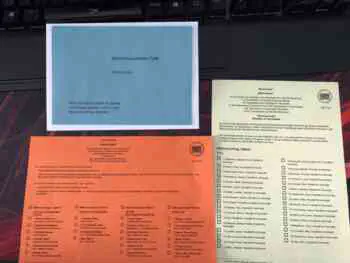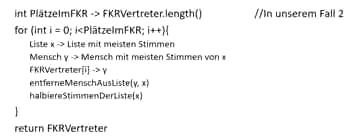Who, how, where, Vote? - The University Elections 2020
Posted on July 8, 2020 by Viktoria Kirchleitner ‐ 6 min read

The time is coming soon: the university election will take place on 28 July. And you can vote! Many of you are probably asking yourselves now: what is this university election anyway? Why should I participate in the election and who and how can I vote at all? In order to collect the most important information and to inform you about the election, we have prepared an overview here. If you find any terms you don’t quite understand while reading, take a look at our glossary, where we have listed the most important terms with short explanations.
What’s the election? What are we voiting for, anyway?
According to the Bavarian Higher Education Act, the University Election (HW) takes place every year. The representatives of two of the most important bodies at faculty and university level, both student and non-student, are elected for the next two-semester term of office: the Faculty Council (FKR, in other faculties also abbreviated as FR) and the Senate. Each stakeholder group can elect its representatives, i.e. students can elect student representatives, WiMi’s the representatives of the research assistants, etc. Every 3 years, all stakeholders can also elect the dean’s office. Mathematics and Informatics elected a new dean last year, Physics elected 2 years ago.
The FKR is the highest body on faculty level and consists of elected representatives of the professors, scientific and non-scientific staff and student representatives. Our 3 faculties all have a single-sized FKR (although e.g. computer science would be big enough for a double-sized FKR), i.e. in our FKRs there are 2 student representatives who can be elected by you during the university election. The FKR deals with pretty much everything that concerns the faculty and does not directly fall into the remit of another body. For example, the FKR discusses new courses of study, changes in the curriculum or habilitations. Often decisions of the FKR have to be approved by the senate later on. The senate is the highest body at TUM level with a total of 11 members with voting rights, including 2 student senators. The senate acts as a controlling body, which also means that the university presidency (including the president) has no voting rights. Its tasks include, among other things, commenting on professor appointments, deciding on changes to the study programme and determining the main areas of research. The TUM Board of Trustees (HR) is closely linked to the Senate. The HR elects the presidency, proposes candidates for the chancellorship or decides on the basic rules of the university. The members of the HR consist of the members of the Senate and 10 external members from politics and economy, i.e. with your election for Senate candidates you also elect your representatives in HR. In addition, you elect your official student representatives according to the Bavarian Higher Education Act (BHG). These can be delegated to committees, such as the Study Commission (StuKo, does preparatory work for the FKR, computer science specific) or the Council of Student Representatives (FSR). The number of elected representatives depends on the number of students. For example, mathematics has 16 places this year, physics 17 and computer science 35.
When, how and where can I vote?
This year the university election takes place on 28 July from 9 am to 5 pm. In principle, there are 2 possibilities to vote: in person or by postal vote.
This year the university election takes place on 28 July from 9 am to 5 pm. In principle, there are 2 possibilities to vote: in person or by postal vote.
 This is how your ballot might look like
This is how your ballot might look like
This year, we strongly recommend the postal vote. The application only takes a minute! You have to go to your TUMOnline business card under “Study”, click on ‘Print Documents’ and under “Election notification and application for postal vote” you can apply for a postal vote. This is possible until July 14th, so that your documents have a fair chance to get to you. It is important to check your address, especially if you are currently not at your regular address. At the HW, candidates for different lists are competing. The election procedure is identical for FKR and Senate, with Senate lists being elected university-wide, whereas FKR lists can only be elected by students of the respective faculty. You have 2 votes each for the election of the FKR representatives and the senators. You can give your two votes to the whole list, which is equivalent to one vote for each of the two top candidates on the list, or you can split it. You can also vote for two candidates from different lists (or two candidates from the same list, but never more than 2).
 The counting procedure is a bit complicated at first.
We have tried to translate it into pseudo code :D.
But since not all of you study computer science or have programming experience, there is of course an explanation:
The counting procedure is a bit complicated at first.
We have tried to translate it into pseudo code :D.
But since not all of you study computer science or have programming experience, there is of course an explanation:
For the first seat, the list with the most votes (i.e. votes to the complete list as well as votes to single candidates) is selected and the candidate with the most votes gets the first seat. Then the total number of votes from this list is halved. For the next seat, the list with the most votes is evaluated again. The candidate with the most votes gets the next seat before the total number of votes on the list is halved again. Fortunately, the procedure has to be repeated only twice for the senate election, for FKR lists the whole procedure is repeated until all student representatives are elected (but only the first two are sitting in the FKR).
Why should I vote?
A lot of university politics is daily business. There’s no other way to put it. There’s hardly any room for big, thematic differences, right? Wrong! There are many worksites, many important projects and not nearly enough time to cover everything. That’s why we need your vote in the elections! You decide what is important to you, you decide which projects we should work on or what you would like to work on yourself, you choose the topics for the coming term! More digital teaching? More campus life in Garching? Cheaper canteen or more vegetarian options? You decide what we should stand up for. In addition, by increasing the turnout, you strengthen the legitimacy of your representatives. Go vote, because voting means to shape the future!
Who can I vote for?
To make sure that you are informed about what the individual lists want to stand for, we have given all lists the opportunity to introduce themselves through a questionnaire. The questions were identical for all lists, the lists themselves are responsible for answering them and the contents. We have made no changes to the answers, we just added some english translations where needed. The lists are listed in alphabetical order. If you still don’t know exactly who to vote for after reading the election manifestos, you can visit the Walomat: https://walomat.asta.tum.de
Mathematics
Liste eurer Fachschaft Mathematik: en_litma_wahlzeitung2020
RCDS-TUM: en_rcds_mathe_wahlzeitung2020
Physics
EuLi: en_euli_wahlzeitung2020
RCDS-TUM: en_rcds_physik_wahlzeitung2020
Informatics:
PING: en_ping_wahlzeitung2020
Senate
Campus university @ TUM (CU@TUM): en_cutum_wahlzeitung2020
Liste eurer Fachschaften (LitFas): en_litfas_wahlzeitung2020
RCDS-TUM: en_rcds_tum_wahlzeitung2020
Die Unparteilichen (UPTUM): en_uptum_wahlzeitung2020


